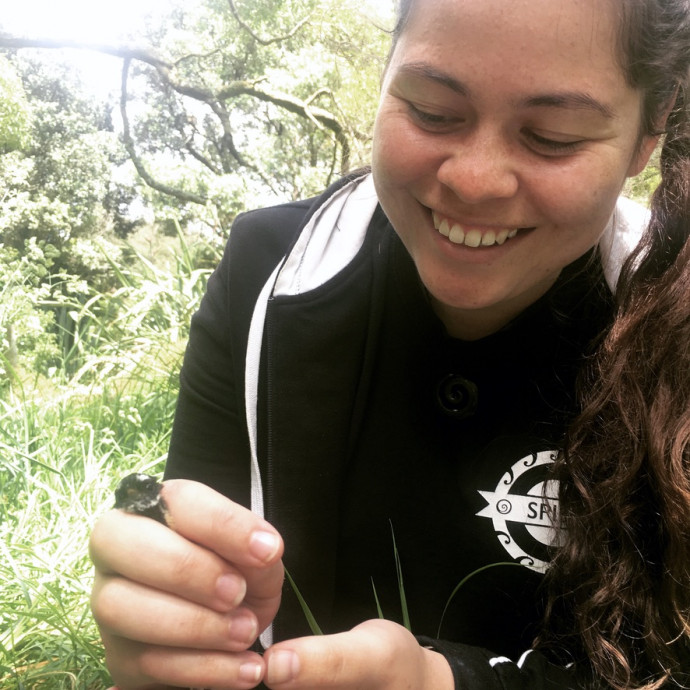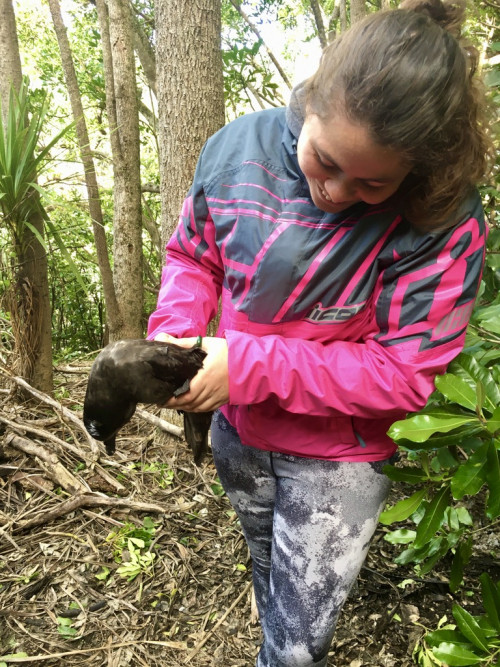News
Published 27 November 2020The Sir Hugh Kawharu Masters Scholarship for Innovation in Science has been awarded to Sarah Davis

Sarah Davis of the University of Auckland has received this scholarship for her master’s research thesis in marine ecology, where she is using seabirds as indicators of environmental stress and ecosystem mauri.
In her research project, Sarah will determine the hormonal stress response and metal contamination of three seabird species - oi, tītī and toanui. Using a mātauranga Māori lens, she hopes to use this knowledge to inform community harvesting and the health of marine ecosystems.
The purpose of her research will also be to conduct a project that genuinely weaves together mātauranga Māori and western knowledge systems into research that benefits Māori communities and furthers the rights of Indigenous knowledge in academic spaces.
Q: What led you to your research topic?
A: My passion for the wellbeing of Aotearoa’s native environment stems from my connection to my hapū and the whenua through my whakapapa. I have always had an interest in our native birds due to their importance in both Te Ao Māori and our native ecosystems. These interests combined with my desire to contribute toward environmental justice led me to develop my research project on native seabirds (specifically ōi and tītī) and marine health.

Q: What or who have been your key motivations along the way?
A: I have been fortunate to have shared my journey with a vast and diverse community of Indigenous scientists, teachers, practitioners and students. All of whom have contributed to my personal development and cultural journey. Their very existence in these elite spaces have both inspired me and reminded me of my true purpose within Western academic spaces, to promote the rights and sovereignty of Indigenous peoples and ensure work within these spaces benefits our communities. This is why scholarships such as the Kawharu scholarship are vital in supporting future leaders in Science as they make spaces more accessible for future students.
Q: What impact do you hope your study has on Aotearoa New Zealand?
A: It is important to me the iwi, hapū and other Māori communities associated with my project benefit from the research. As such, I intend for my research to help identify the state of contamination in harvested seabirds which can also indicate pollutant levels in their surrounding ecosystem. This has direct implications for marine health, bird health, and the health of those communities consuming these harvested birds. However, I also hope to see a deeper impact as a result of my research in the enhanced acceptance and engagement with mātauranga Māori within academia and Aotearoa New Zealand. If successfully implemented I hope for my project to lead by example in demonstrating genuine and appropriate collaboration between western and Indigenous knowledge systems.
Q: What does this scholarship mean to you?
A: To me, the most valuable benefit of this scholarship is the opportunity to completely commit myself to my research. With this scholarship’s contribution to my living costs, I can focus on producing research of the highest quality without the stress of maintaining part-time work. This will be crucial for achieving my aspirations for the positive impacts of my research.
About the Sir Hugh Kawharu Masters Scholarship for Innovation in Science
The Sir Hugh Kawharu Scholarship for Innovation in Science, administered by Royal Society Te Apārangi, is a $10,000 scholarship for study at masters level in the sciences.
This year, 17 nominations were received. The assessment panel consisted of Amokura Kawharu (Trustee, Sir Kawharu Foundation), Associate Professor Marama Muru-Lanning (Trustee, Sir Kawharu Foundation, University of Auckland); and Mr Andrew Sporle (Nominee, Royal Society Te Apārangi, University of Auckland).
